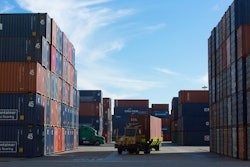The California Supreme Court on Monday issued a ruling outlining loose criteria by which carriers should determine whether a driver is an employee — and thereby entitled to certain benefits and protections granted by California labor laws — or an independent contractor, and thereby not subject to requirements like minimum wage and meal and rest breaks, among other benefits.
Though the issue of driver classification presents legal questions for carriers and drivers nationwide, it’s a topic mostly isolated to port truckers, with a keen focus on California-based truckers, given the state’s stringent labor laws. However, the California Supreme Court Decision is likely to have little impact on carriers and drivers, especially outside of California, as its ruling didn’t pertain directly to litigation brought by drivers against carriers. The decision instead involved a case of a carrier suing a lower court, with the California Supreme Court’s decision determining whether the Superior Court of Los Angeles could certify a class of driver plaintiffs in a lawsuit brought by two drivers against a carrier.
The California Supreme Court ruled that the Superior Court could certify the class, as it did in the ongoing case (originating in 2004) several years ago.
In short, the Supreme Court’s decision contends that “California public policy favors the classification of most workers as employees,” according to an explanation of the decision distributed by transportation law firm Scopelitis. The firm says it’s still reviewing the court’s findings in the case, Dynamex Operations West Inc. vs. Superior Court, and plans to issue more definitive analysis.
Broadly, the decision seemingly presses carriers to classify drivers as employees and not contractors. The state’s high court used the so-called ABC test to make its determination. The ABC test centers on questions about the employer’s control over the employee’s/contractor’s daily tasks and the nature of the work performed. If employers exert a high-level of control over the type and manner of the work performed, the worker generally should be classified as an employee, according to court precedent, reiterated by the California Supreme Court in its decision.
If workers’ tasks are part of the business’s core functions, it’s also more likely they’ll be deemed employees by courts.
Drivers involved in this case were delivery drivers, making the case similar to lawsuit filed against Penske Logistics and Affinity Logistics, court decisions of which were issued in 2014. Both rulings favored the drivers, arguing that the level of control exerted by the carriers over its drivers meant the truckers were employees, not contractors, and should be classified as such.
A litany of lawsuits have been filed in recent years in California, many of them backed or at least promoted by the Teamsters Union, seeking to reclassify drivers as employees and grant them back wages for benefits and pay not received during their time as contractors.









